#online ai writer for film
Text
Transform Your Film Editing Process with AI Blog Writer
Film editing is a nuanced and intricate process that can make or break the success of a film. It's the art of selecting, arranging, and manipulating raw footage to create a cohesive and compelling narrative. With the advent of technology, the Film Editor AI Blog Writer emerges as a transformative tool, offering filmmakers innovative ways to streamline their editing process and unlock new creative possibilities.
At its core, the Film Editor AI Blog Writer serves as a virtual assistant, providing filmmakers with a wealth of resources and insights to enhance their editing process. Through its curated content, the AI Blog Writer explores a wide range of topics related to film editing, from the fundamentals of editing theory to advanced techniques and emerging trends. Whether it's learning about the principles of continuity editing, exploring the psychology of editing, or mastering the technical aspects of editing software, the AI Blog Writer equips filmmakers with the knowledge and tools they need to elevate their editing skills.

One of the primary ways in which the AI Blog Writer transforms the editing process is by offering practical advice and tutorials to help filmmakers navigate the technical complexities of editing software. From software recommendations to workflow optimization tips, the AI Blog Writer provides filmmakers with step-by-step guidance to streamline their editing process and improve efficiency. By demystifying the technical aspects of editing, the AI Blog Writer empowers filmmakers to focus on storytelling and creativity without being hindered by technical hurdles.
Moreover, the AI Blog Writer leverages the power of artificial intelligence to offer personalized recommendations and insights tailored to the specific needs and interests of each filmmaker. Through its advanced algorithms, the AI Blog Writer analyzes user preferences, viewing habits, and editing styles to deliver customized content that resonates with filmmakers on a deeper level. Whether it's recommending articles, tutorials, or case studies based on a filmmaker's specific interests and skill level, the AI Blog Writer ensures that filmmakers have access to the most relevant and impactful resources to enhance their editing process.
In addition to its focus on technical proficiency, the AI Blog Writer also encourages filmmakers to explore new creative possibilities and push the boundaries of their craft. By showcasing innovative editing techniques, emerging trends, and avant-garde approaches to filmmaking, the AI Blog Writer inspires filmmakers to think outside the box and experiment with new ways of storytelling. Whether it's exploring the possibilities of non-linear storytelling, experimenting with visual effects, or embracing unconventional editing styles, the AI Blog Writer encourages filmmakers to break free from traditional norms and explore new avenues of expression.
Furthermore, the AI Blog Writer fosters a sense of community and collaboration among filmmakers, providing a platform for networking, sharing ideas, and seeking feedback. Through its interactive features such as forums, comment sections, and peer-to-peer networking, the AI Blog Writer facilitates meaningful connections and encourages filmmakers to learn from one another, exchange insights, and support each other's creative endeavors. By fostering a sense of camaraderie and collaboration, the AI Blog Writer enriches the editing process and creates a vibrant community of passionate storytellers.
In conclusion, the Film Editor AI Blog Writer offers filmmakers a transformative tool to streamline their editing process, unlock new creative possibilities, and connect with a global community of peers. By providing practical advice, personalized recommendations, and inspiring insights, the AI Blog Writer empowers filmmakers to elevate their editing skills and push the boundaries of their craft. As technology continues to evolve and shape the future of filmmaking, tools like the AI Blog Writer stand as a testament to the transformative power of AI to enrich and enhance the creative process.
#film-editor ai blog writer#film-editor ai blog writer free#online film-editor ai blog writer#best film-editor ai blog writer
1 note
·
View note
Text
'Puella Magi Madoka Magica -Walpurgisnacht: Rising-' Announces Winter 2024 Debut
On Sunday, at Aniplex Online Fest 2023, Aniplex revealed a new teaser trailer for Puella Magi Madoka Magica The Movie: -Walpurgisnacht Rising- (Mahou Shoujo Madoka★Magica: Walpurgis no Kaiten).
The trailer revealed that the anime film, which continues the Puella Magi Madoka Magica main timeline after the events of the 2013 film Rebellion, will debut theatrically in Japan in Winter 2024.
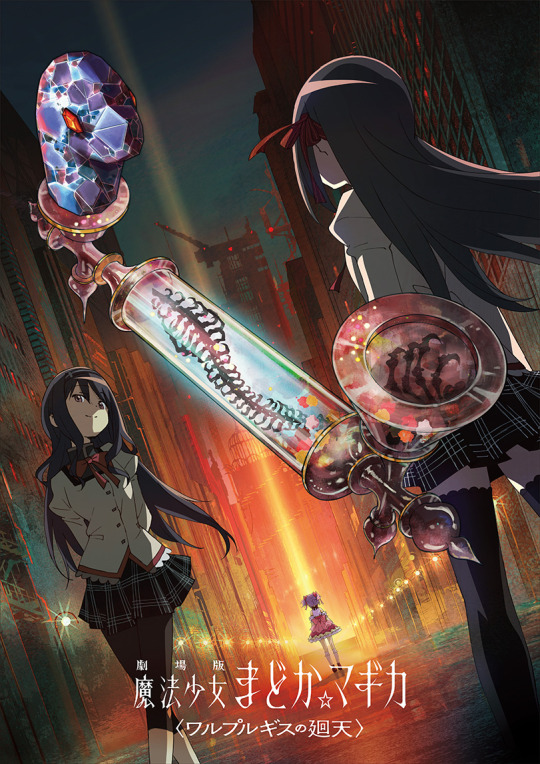
Aniplex also revealed a new key visual for the film and announced that director Yukihiro Miyamoto, who directed the original 2011 television anime series, its two film adaptation, Rebellion, and spin-off Magia Record is returning for Walpurgisnacht: Rising at SHAFT.
He is joined by the previously revealed staff, including the original creators Magica Quartet, chief director Akiyuki Simbou, writer Gen Urobuchi (Nitroplus), and character designer Aokiume. Additional returning staff includes character animation designer Junichiro Taniguchi, who served as Chief Animation Director on previous projects, parallel world designer Gekidan InuCurry (Doroinu), who created the iconic, unique looks of the Witches Labyrinths, and composer Yuki Kajiura.
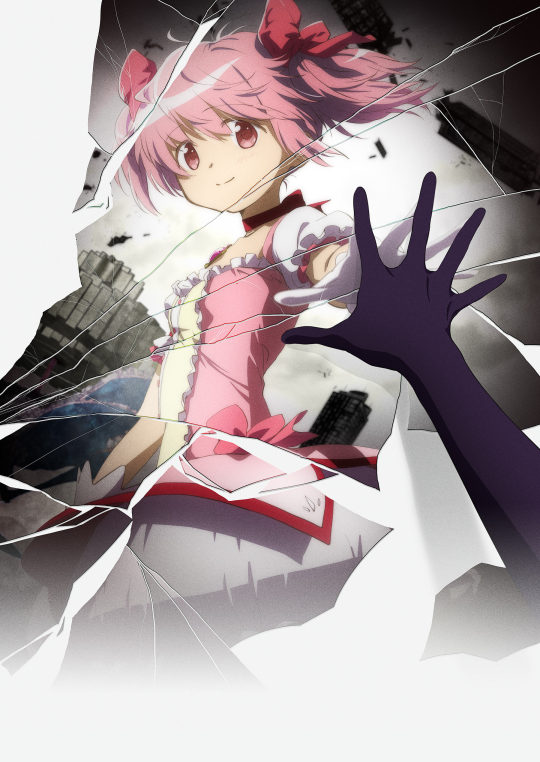
All of the original Japanese main voice cast from the series and Rebellion are set to reprise their roles:
Aoi Yuki as Madoka Kaname
Chiwa Saito as Homura Akemi
Kaori Mizuhashi as Mami Tomoe
Eri Kitamura as Sayaka Miki
Ai Nonaka as Kyouko Sakura
Kana Asumi as Nagisa Momoe
Emiri Kato as Kyubey
The anime was originally announced back in 2021, but in 2019 at Anime Expo, Homura's voice actress, Chiwa Saito, foreshadowed the sequel, saying that "the actual series has not ended yet" and that she was looking forward to everyone seeing Devil Homura, a reference to the ending of Rebellion, again.
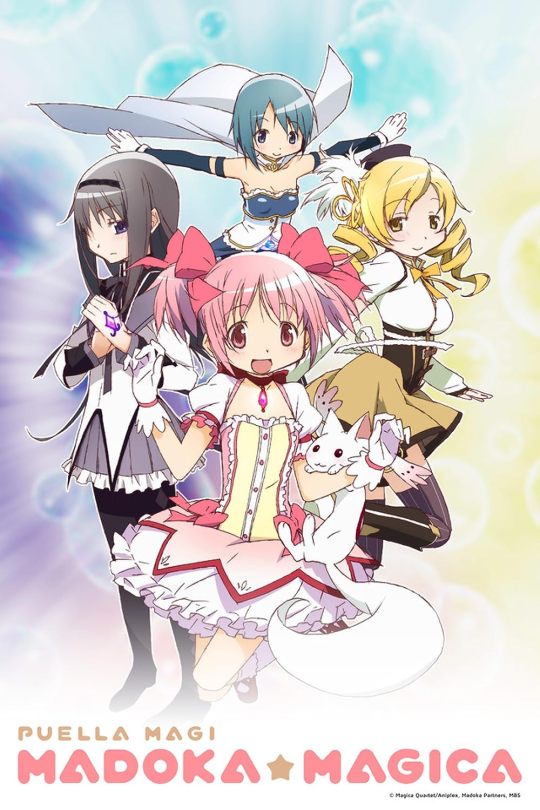
Puella Magi Madoka Magica aired in 2011 to critical and audience acclaim. It became a cultural phenomenon and spawned two movie adaptations, Beginnings and Eternal, the sequel film Rebellion, and multiple manga and video game spin-offs. It is credited with popularizing mixing dark, postmodern tropes with the magical girl genre.
Source: Aniplex Online Fest 2023, Press Release
#madoka magica#puella magi madoka magica#yuri#anime#news#girls love#lgbt#gay#lgbtq#gl#queer#lesbian#manga#yuri anime#mahou shoujo madoka magica
816 notes
·
View notes
Text
The End Is Near: "News" organizations using AI to create content, firing human writers
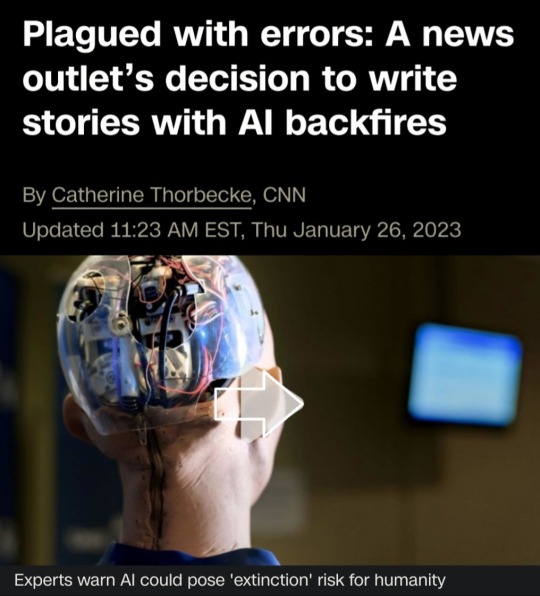
source: X
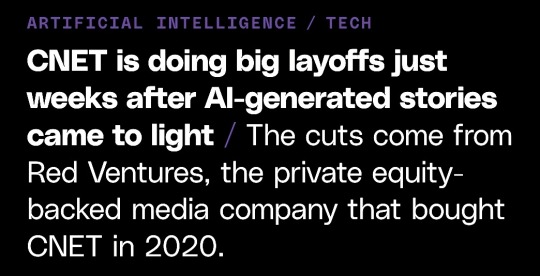
source: X
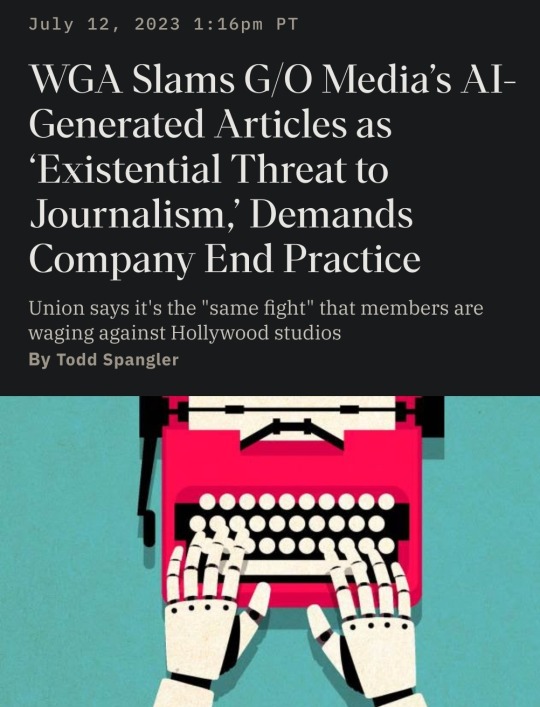
source: X
an example "story" now comes with this warning:
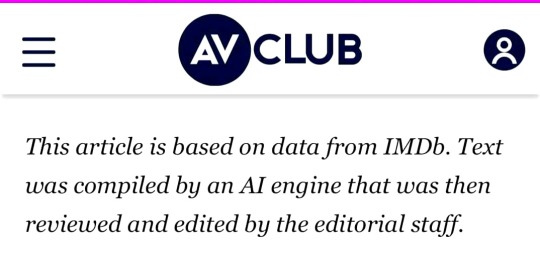
A new byline showed up Wednesday on io9: “Gizmodo Bot.” The site’s editorial staff had no input or advance notice of the new AI-generator, snuck in by parent company G/O Media.
G/O Media’s AI-generated articles are riddled with errors and outdated information, and block reader comments.
“As you may have seen today, an AI-generated article appeared on io9,” James Whitbrook, deputy editor at io9 and Gizmodo, tweeted. “I was informed approximately 10 minutes beforehand, and no one at io9 played a part in its editing or publication.”
Whitbrook sent a statement to G/O Media along with “a lengthy list of corrections.” In part, his statement said, “The article published on io9 today rejects the very standards this team holds itself to on a daily basis as critics and as reporters. It is shoddily written, it is riddled with basic errors; in closing the comments section off, it denies our readers, the lifeblood of this network, the chance to publicly hold us accountable, and to call this work exactly what it is: embarrassing, unpublishable, disrespectful of both the audience and the people who work here, and a blow to our authority and integrity.”
He continued, “It is shameful that this work has been put to our audience and to our peers in the industry as a window to G/O’s future, and it is shameful that we as a team have had to spend an egregious amount of time away from our actual work to make it clear to you the unacceptable errors made in publishing this piece.”
According to the Gizmodo Media Group Union, affiliated with WGA East, the AI effort has “been pushed by” G/O Media CEO Jim Spanfeller, recently hired editorial director Merrill Brown, and deputy editorial director Lea Goldman.
In 2019, Spanfeller and private-equity firm Great Hill Partners acquired Gizmodo Media Group (previously Gawker Media) and The Onion.
The Writers Guild of America issued a blistering condemnation of G/O Media’s use of artificial intelligence to generate content.
“These AI-generated posts are only the beginning. Such articles represent an existential threat to journalism. Our members are professionally harmed by G/O Media’s supposed ‘test’ of AI-generated articles.”
WGA added, “But this fight is not only about members in online media. This is the same fight happening in broadcast newsrooms throughout our union. This is the same fight our film, television, and streaming colleagues are waging against the Alliance of Motion Picture and Television Producers (AMPTP) in their strike.”
The union, in its statement, said it “demands an immediate end of AI-generated articles on G/O Media sites,” which include The A.V. Club, Deadspin, Gizmodo, Jalopnik, Jezebel, Kotaku, The Onion, Quartz, The Root, and The Takeout.
but wait, there's more:
Just weeks after news broke that tech site CNET was secretly using artificial intelligence to produce articles, the company is doing extensive layoffs that include several longtime employees, according to multiple people with knowledge of the situation. The layoffs total 10 percent of the public masthead.
*
Greedy corporate sleazeballs using artificial intelligence are replacing humans with cost-free machines to barf out garbage content.
This is what end-stage capitalism looks like: An ouroborus of machines feeding machines in a downward spiral, with no room for humans between the teeth of their hungry gears.
Anyone who cares about human life, let alone wants to be a writer, should be getting out the EMP tools and burning down capitalist infrastructure right now before it's too late.
652 notes
·
View notes
Text
I had a few things I wanted to say about Nano, and how disappointing it is that one of the last bastions of the internet that was truly about fun and people sharing their interests- the internet of Geocities pages and Livejournal blogs- has fallen to the dark side in such a definitive way.
The original intent of NaNoWriMo, back in the day, was to Write the Thing. To get the words out. At the end of 30 days, it was expected you'd have a raw, messy, but gloriously 50,000-word first draft you could build upon, edit, or completely delete as you so wished. The idea of using generative AI to produce a polished manuscript that you didn't actually write is completely contrary to that spirit.
And miss me on the "if you're against AI you're ableist and classist" bullshit. Generative AI that scrapes other writers' words without their consent or compensation and approximates it for others is not an access tool. It stands to cost people, including poor and disabled writers, their jobs as publications naively turn to AI instead of paying writers. How many disabled and poor writers have been fucked over by having their work stolen by generative AI databanks, and they can't afford to challenge it?
In the amateur writing world, betas, proofreaders, volunteer editors - these are all things. I've betaed others' work and had mine betaed in return, entirely as a free exchange of support for each other's passion in writing. It's a place where you will find people willing to support you and your writing without any monetary expectations. But I guess Nano forgot that?
It's a shame. I miss the days of the internet where you could read someone's Livejournal blogs about their day, or see someone's painstakingly assembled little Geocities page about their favorite film, or enjoy content created by others for no reason other than to share it online - no influencers, no sponsors, no product placement. We all know that world is gone, and the Nano that was so good 20 years ago is also gone.
I still had a Nano account, unused for years, and yesterday I deleted it.
73 notes
·
View notes
Note
About YFind: I was talking about it with a group of friends and many of us found it shady, but could only get part of the information in English. We do unfortunately not speak Thai, but we are curious, sceptical and very much looking forwards to seeing how this develops.
Any chance you could translate the terms and conditions?
I will say... you're right to be skeptical. They're just vague enough to prevent any potential future lawsuits against the company, but not the other way around...
Here we go:

Terms and Conditions
The written synopsis must be submitted in Thai. The synopsis should be submitted according to the following format:
1.1 Page 1
- Must include the writer's relevant information: Legal First and Last Name, Age, Address, Telephone and/or Mobile Number, E-mail, Line ID or other social channels for contact
- Title
- Genre
- A brief description of the story's original inspiration (if any)
1.2 Pages 2-4
- A 3-page synopsis, size A4, to be submitted as a WORD or PDF document named according to the following format (1 submission per one 1 applicant limit):
Title_First-LastName (please use your legal First and Last name, do not use a pen name)
Each applicant can submit up to 2 synopses, not restricted to the same genre, according to the specified format. Applicants can only submit once, with no more than 2 synopses included in their submission. Once the document has been successfully submitted into the system, information can no longer be edited or changed. In the event that an applicant has submitted duplicate (or more than one) documents, only the first submission will be considered and accepted.
Applicants must be Thai citizens. There are no age restrictions.
Submissions must not purposefully replicate any previous publications, broadcasts, or depictions in media. This includes works that have been previously submitted in other contests, whether in written form, online, or through other various channels.
Submissions must be the sole creative work of the writer, who must identify as the sole applicant. Submissions must not infringe upon copyright or intellectual property rights. Applicants must not defame(insult) someone else by plagiarizing, reproducing or revising their work to submit as their own. The use of AI or other technology to create a synopsis is strictly prohibited and will be found in violation of the rules and regulations. If submissions are later found to be within violation of the law or any of its regulations, the Company and those whose rights have been violated are authorized to take legal action.
The winning submission's rights will become the copyright of the Company. The Company can use it's rights as it deems appropriate, not limited to reproduction, adaptation, and novel and/or poetry publication: The property can be produced as a drama (series) and/or film to be distributed to the general public through any partnered media company; The Company can collect any benefits relating to the copyright of the property, including sales, payments, and transfers for authorized lending of the property to others; Benefits can be collected from any commercial or non-commercial use of the property; And/or the Company can make any international distribution decisions throughout the span of it's property's copyright protection and/or the rights of the property according to the law. The Company can do so without having to pay compensation to and without asking permission from the applicant. All winning submissions will receive a reward when notified by the company. Upon notification, the owner of the submission must sign the appropriate 'copyright and rights transfer' documents. Failure to do so will disqualify winners from receiving a reward.
The reward cannot be exchanged or transferred. The prize money is subject to the withholding of tax according to the rate specified by law.
The Company reserves the right to investigate the validity and integrity of each submission according to the ownership conditions for receiving the prize money. If any work is found to not be in accordance with the Company's conditions, the Company can immediately disqualify the applicant without notifying them. Applicants must agree and accept any decisions of the Company, and/or the person designated by the Company, throughout every step of the selection process, including their selected winners who will receive the reward according to the Company's wishes. All final decisions remain at the discretion of the Company, and/or the person designated by the Company, without need of explanation. Applicants do not have any right to complain or object.
#GMMtv#some of the legal jargon goes over my head#so be wary of its accuracy#answered#talk thai to me
17 notes
·
View notes
Text
Hollywood has an inclusivity problem. How is this possible, in 2024, you wonder, when films like King Richard or Sound of Metal or Everything Everywhere All at Once—all nominated for Best Picture Oscars—suggest otherwise. They are films rich in story, dimension, and purpose. They are also exceptions to a long-established rule: White men still run Hollywood. Women remain almost entirely shut out, compared to their male colleagues, while disabled and Black actors are underrepresented in all major employment arenas for theatrical film, according to UCLA’s most recent Hollywood diversity report.
In the face of this, Kamala Avila-Salmon wants better for Hollywood and its storytellers. Avila-Salmon is the head of inclusive content at Lionsgate Motion Picture Group, where she began her stint in 2020 and has since leveraged her experience as a marketing savant (she has held top-level roles at RCA, Universal Pictures, Google, and Facebook) to shift how the studio makes movies. At Lionsgate, her main directive is simple: to create a creative economy that allows for more attentive storytelling. Stories of magnitude and conviction, yes, but also ones with as much reach as possible. It begins, she tells me, by having an “audience-first” mindset.
This month she launched Story Spark, an online tool that helps creatives understand the limits of their scripts and hiring choices by pushing for inclusivity in all aspects (it resembles a BuzzFeed-style multiple-choice questionnaire). As AI threatens a shrinking workforce and streaming upends traditional viewership, Avila-Salmon believes Story Spark can be a bridge to a healthier future for Hollywood. “Story Spark isn’t telling you if the movie is good,” she jokes when we chat over Zoom. “I have no idea.” You don’t upload a script. There is no secret counsel of industry insiders judging your work behind the scenes. Story Spark is simply meant to challenge writers and filmmakers to create their most audacious work possible. And, yes, there will be plenty of notes.
13 notes
·
View notes
Text
The SWG Hosts Tolkien Fanworks
Fandom creators may be looking for alternative and additional archives, in light of the multiple critiques currently being made of the OTW and AO3.
This is not intended as commentary on the many issues raised about the OTW and AO3 in recent weeks, although an unofficial position of our organization (as a small archive) has always been that it is ideal to archive your fanworks across multiple sites, and multiple options for archiving should exist. Rather, this post will provide information about who we are and the fanworks we accept so that Tolkien fanworks creators can decide if our archive is a viable option for them.
What is the SWG?
The Silmarillion Writers' Guild was founded in 2005 by @dawnfelagund, and our archive opened in 2007. Our mission is to provide an online archive and community for anyone interested in The Silmarillion that values civility and openness in discussing and making fanworks about Tolkien's legendarium. You can read the SWG's complete mission here.
We currently archive just over 5,000 fanworks by 414 creators. In addition, we offer monthly creative challenges, publish a weekly newsletter that features research by our members, maintain a reference library and beta-reader directory, compile a listing of Tolkien fandom events, and host events such as live readings, fanfiction book clubs, and collaborative creative sessions on our Discord.
What fanworks does the SWG accept?
The SWG is an archive for Silmarillion-based fanworks. We try to define the term "Silmarillion-based" as broadly and inclusively as possible so that we can welcome as many fanworks on our site as possible while maintaining our purpose as a Silmarillion group. Significant use of a source, character or character group, location, or time period featured in The Silmarillion, as long as it is not also covered in detail in The Hobbit or The Lord of the Rings, qualifies a work for our site. Our detailed FAQ on how we define "Silmworks" can be found here.
We accept crossover, alternate universe (AU), and multi-age fanworks, as long as a significant component meets the "Silm fanwork" definition above.
Non-Silmarillion Tolkien Fanworks. We recently added a section to our site called Beyond the Silmarillion, which accepts all fanworks based on Tolkien's writings or Tolkien-based adaptations (films, shows, games, etc.) SWG members become eligible to post in this section once they have archived five fanworks or 10,000 words with us, whichever comes first.
Types of Fanwork We Archive. The SWG currently accepts the following types of fanwork: writing (fiction, nonfiction, plays/screenplays, and poetry), artwork, audio, video, link collections, playlists, series, and multimedia fanworks that include two or more of the formats above. If you need to archive a fanwork that doesn't match any of the above, the site moderators will help you archive your work with us, if it's possible to do so. With the exception of video, we host all fanworks on our server. (Videos must be posted to a video hosting site.)
Ratings and Adult Content. We accept all ratings of fanwork. The only adult-rated fanworks we cannot accept are images or videos that include "graphic depictions of sexual activity, sexualized nudity, and any representation of an underage character in a sexual situation" because these fanworks violate the Terms of Service of our webhost.
AI-Generated Fanworks. We do not accept fanworks entirely or partially produced through prompting an AI generator. Our AI policy can be found here.
What are the conduct expectations for SWG members?
Simply put, the SWG "is a positive-focused, open-minded space." We require civility in all interactions conducted on our archive and affiliated social sites. The SWG is a moderated site and community, so we do hold our members to our expectations. You can read our complete Site Etiquette and Terms of Service here.
How is the SWG governed?
The SWG was founded and is currently run by Dawn Felagund, assisted by a team of moderators. Active moderators are Russandol, Grundy, Lyra, Saelind, and Janeways; they make the ultimate decisions concerning the archive. Other volunteers aid other tasks needed to run the site and community and may contribute to decision-making as well.
The SWG is not a democracy in that we do not hold formal elections and there are certain aspects of our mission that we are unwilling to change, even under majority preference. However, we consider member feedback as part of our decision-making process whenever possible—especially with regard to decisions on controversial or impactful issues—and some of the policies and features we've implemented over the years have come about by member request.
Members who need assistance, have a concern, or wish to make a suggestion can contact the moderators directly or use the #town-hall channel in the SWG's Discord.
We aim (and are generally able) to reply to all communications from members within twenty-four hours.
Because we are a small organization with relatively few decision makers, we can generally implement change relatively quickly. Our recent AI policy offers a good example of how governance in our group works. The issue of AI-generated fanworks was raised in a discussion among the site and Discord moderators on May 5. In this discussion, the moderators shared information and came to a consensus on how they wanted AI-generated fanworks handled on the SWG. Dawn drafted an AI policy, which was put before the other moderators for feedback on May 9. By May 13, the site admins had researched and implemented a block on AI scraper bots using all known strategies. Also on May 13, the AI policy was opened for public comment through May 26, during which time members and other interested parties shared suggestions via email with the moderators and in discussion in the #town-hall channel on Discord. During this time, the draft policy was revised twice using those suggestions. On May 28, the finalized policy was announced on the SWG's site and social networks, and relevant documents on the site were updated to reflect and link to the new policy.
How does the SWG handle racism and other attacks on groups that have been historically marginalized in fandom and beyond?
As stated in our Site Etiquette, as an organization, we recognize that fandom and the Tolkien fandom specifically has historically been and continues to be hostile to and dismissive of fans from marginalized groups, including fans who are Black, indigenous, and people of color (BIPOC); women; LGBTQIA+; and fans with disabilities. We believe strongly that, as a fandom organization that has benefited from the status quo, we must also be part of the solution to ensure that these inequities do not persist.
Specific solutions we have implemented on our group include:
Our Site Etiquette and Terms of Service strictly forbids "[a]ttacks on other members based on personal characteristics (such as race, color, religion, ethnicity, nationality, age, sexuality, gender identity or expression, disability, or medical condition)" and states that "[a]busive or derogatory behavior will not be tolerated at any time or in any part of the SWG. We do not welcome or allow any content in our group that is designed to be hurtful or insulting." While we generally observe a three-strike policy for rule violations, "[i]f moderators feel that someone is acting deliberately to harm SWG and/or its members … we reserve the right to suspend that person's account without prior warning." Our hope with this policy is to allow members who mess up the opportunity to improve while also having the ability to remove bad actors immediately.
We currently require fanworks on our site to be correctly labeled with warnings, including fanworks that include "in-universe intolerance," such as racism, homophobia, and misogyny. Creators have the option of labeling a fanwork as "Choose Not to Warn" if they do not want to label their fanwork. Our ratings and warnings policy is here.
We maintain an inclusivity focus group that we consult on policies and issues related to inclusivity or that may have a disproportionate impact on some groups of fans. Any SWG member who is part of a group historically marginalized in fandom is welcome to join this focus group and participate when and how they feel comfortable. Any member can request the input of the inclusivity focus group on a moderator decision.
If I want to archive my work with you, what is the best way to do this?
First, review the Site Etiquette and Terms of Service, and if you believe our group is a good fit for you and your work, register for an SWG account.
A moderator will approve your account before you can begin posting or commenting on the site. We aim to approve new accounts within twenty-four hours of registration; typically, it takes much less time than that to be approved.
Once you are approved, you can begin posting your fanworks! We do ask that new members who are archiving many older works with us to backdate these fanworks and exclude them from the Most Recent list to allow creators posting new work to have that spotlight.
Questions on how to use the site, SWG policies, or how best to archive past works with us are welcome via the site's contact form, by emailing the moderators at [email protected], or reaching out to the mods via any of the SWG's social media.
85 notes
·
View notes
Text
A general note on AI in the arts, the creative industries, and similar:-
Generative "AI" used in those spheres accomplishes two main things.
Reducing quality (and getting those who engage in the art vastly more comfortable with poorer quality, less interesting work).
Destroying jobs and opportunities for artists.
I really, really would like us not to get to the point where "real" art made by actual visual artists/voice actors/composers/writers/etc. is a luxury commodity, and the only artists who can actually work are the most privileged (usually those with a private additional income). But we are going very very fast in that direction.
It is also worth reiterating that the artists who will suffer most from this are those who are in marginalised demographics (especially disabled artists (and fuck those using disabled artists as a justification for this; I know so many disabled artists and they are all *furious* at what's happening), artists of colo(u)r, LGBT+ artists). Also that the general population including those on a low income deserve access to real art, dammit.
Please remember that limiting access to the arts (both as audience and practitioners) to the wealthy only is a right-wing priority, and has been for literal centuries. Please remember that the scorn towards arts professionals (especially actors and singers) that is practised on the left as well as the right dates back in western history to the Roman era, and was formed from slut-shaming, classism, xenophobia, and the practice of enslavement. You do not want to be going along with that crap. (Also reminder here to ignore all and any "how much does [celebrity] earn?" sites; they lie. And most arts professionals in all fields are below average in income and wealth. And getting more so.)
If you value social justice, if you value any of the arts, if you value humans getting to do one of the most important of human things: do not use ChatGPT, do not use Midjourney, do not use creation-replacement "AI" generally. And do not engage, especially financially, with any "AI" "art". Don't play the games that replace voice actors with "AI", don't read the books or the fics that use ChatGPT, don't like or reblog the visual "art" if you can help it, don't watch any films or tv shows that use "AI" in any way. Don't read online magazines that use ChatGPT instead of employing copywriters. Just. Keep away from all of it.
Production companies etc. are pushing "AI" on all of us. Don't let them. Their sphere of action is limited if we all make it clear how profoundly not-keen we all are in the arts being wrecked like this. Maybe give a bit of extra love, attention, and/or money to an artist of some kind today. :-) And maybe try to go and see a play or an exhibition or an art gallery or buy a paperback or go to hear some live music played in a pub/bar or play a game where there's a known cast list of voice actors. :-) And make some art yourself!! Even if it's not very good, it's being made by you and it's something you care about and that's an awesome thing. <3
There are a lot of cases where consumption gets treated as activism when it isn't any such things. In this case, it comes a hell of a lot closer to being it.
Disclaimer: sometimes "AI" can be hard to spot. And sometimes people are obnoxious and go around commenting on fanfics and or art accusing innocent people of using it, which is a horrible thing to do. Learn the warning signs if you can, but do please be aware that you might be wrong.
8 notes
·
View notes
Text

The WGA Agreement and AI 🤖
The Writers Guild of America leadership has just voted to recommend the new agreement to the union membership, bringing the writers strike to an end! Included in the agreement are new restrictions on the use of AI tools in the writing room and protections for writers. Given the buzz around artificial intelligence not just in films and television but also in online media production, I wanted to talk about these.
What's notable is that AI tools aren't outright banned. However, the use of them to replace writers has been severely curtailed. AI cannot be credited with writing a script or any kind of source material, a writer cannot be forced to use AI, and the use of AI to generate materials must be declared when they are handed to a writer. In addition, writers are protected from AI using their work and ideas; feeding WGA members' scripts into an AI to train it is disallowed by this collective bargaining agreement.
Again, artificial intelligence has not been outright banned. But these new provisions dramatically limit their use as cost-cutting (read: human-replacing) measures.
While this is far from the only provision in the agreement, these steps help ensure that any benefits from the technology can be captured by all stakeholders, and not just the studio heads at the top! If you want to read more about the Minimum Bargaining Agreement you can find it at: https://www.wgacontract2023.org/the-c...
14 notes
·
View notes
Text
Mori theories, maybe cannon, and connections.
Mori in BSD is someone who takes pleasure in other’s demise/torment, there is no denying that. Along with the fact I am no ‘Mori Fan’ I can assure you that this is not a fan post.
But there are some theories and maybe cannon things about Mori that keep me awake. For example: Mori has his ability being ’Elise’ and it can do mostly anything he requests, along with creating a perfect replacement of a human body, which would be perfect for practicing as he is a doctor.
This thought can lead to other thoughts, such as Yosano and her tendencies to shred her patients apart for her own pleasure of sorts. She could’ve been influenced by Mori and his doctor tendencies on Elise. Though this all has to depend on the fact that Mori did in fact experiment on ‘Elise’ in cruel ways.
Having Yosano and Mori having a deeper connection would be intriguing lore. And reading a little about the real life Mori Ōgai and his daughters, along with Yosano Akiko’s run down of their lives. They both have the connection of expressing sexual feelings. Taking off the fact that Elise may also represent Mori’s daughter for this theory, Elise in some scenes represents a nurse like Yosano. But Elise being a nurse could also represent Moris past of being a doctor.Also reading up on Mori, he also supported the theory of the ‘unconscious mind’ by Von Hartmann. This can connect back to him trying to get his ability to feel human and have its own thoughts.
Going back to the sexual things that the author Mori Rintarō has written, such as Sansho Dayu that was directed by another author/film director Kenji Mizoguchi. Now this may just be a coincidence, however seeing that BSD always has connections, from what I have read, the author Kenji Mizoguchi has no other connections with Bsd based characters besides Mori and Kyōka Izumi. Honestly I could go down another rabbit hole with Kenji’s and Kyōka’s connections, but I’ll keep on going with Mori’s in this post.
Bringing it back a bit, another connection that Mori Rintarō has was with Jun'ichirō Tanizaki. This should give flash backs to the two siblings in Bsd, Naomi, and Jun'ichirō. Seeing how Mori Rintarō is very associated with sexual writing, it also came to no surprise that the author Jun'ichirō Tanizaki also has some sexual traits within his own work such as Chijin no ai that also includes obsessive love within that.
With these two characters Jun'ichirō, and Kenji having seemingly no connection whatsoever to Mori within the anime/manga Bsd, I can’t help but think that this is just a sort of connection to represent the very presence of sexual tension in Bsd that is quite overlooked. I would feel like Jun'ichirō is not done with the Port Mafia business with how his author is connected to Mori. But Kenji is a character that is questionable with the connection to Mori and seeing how that would connect to Bsd.
However, the most interesting connection I have found with the writer Mori Rintarō is his connection with Natsume Sōseki. They both contributed to a book called Suicidal Honor. First thought, Osamu Dazai. However, the connection to Dazai rose even more when the main run down of the book is about Emperor Meiji’s funeral then General Nogi Maresuke committed ritual suicide by seppuku (disembowelment). Making that a double suicide. Honestly, the connection is very complicated, along with Natsume Sōseki being a connection that doesn’t really have a book about sexual relations that is kinda Mori Rintarō whole career is based around. Making this a connection back to Bsd with Dazai. Having this could implicate that they have some sort of conscious of the ‘book’ with many other theories also suggesting this online.
But at the end, I don’t really know where I’m going with this, it’s just some quick thinking of different cannon things and theories. Late night thoughts just hit different.
9 notes
·
View notes
Text
A Little Goncharov for Thanksgiving

I learned about Goncharov the way I learn about most memes and pop culture, from my teenagers. In the days leading up to Thanksgiving, we had a group chat spring up on Discord that included two family friends who were going to be joining us for the holiday from out of town. One of the topics of conversation turned to Goncharov, the imaginary film around which an active Tumblr fan community had sprung up, as if it had been a real, little-known cult classic from 1973 made by Martin Scorsese.
It became a fun creative exercise—in the middle of the day, one of the kids would send a question about Goncharov: “What do you think about the relationship between Katya and Sofia?” or “What did you make of the clock tower imagery?” or “Goncharov… iphone or android guy?” To which someone else would playfully answer.
This same kind of thing was happening on a massive scale on Tumblr, where artists created movie posters and promotional materials, composers posted songs and soundtracks, people posted deleted scenes and script fragments. There are reviews and academic papers, fictitious Wikipedia and IMDb listings, and A LOT of fan art.

Lynda Carter posted a photo on her Tumblr with Henry Winkler that she captioned, “Me and ‘The Fonz’ at the premiere of Goncharov (1973) at Grauman’s Chinese Theatre.”
Discussions popped up about the characters and who would play them in the reboot. Posts were shared hundreds, then thousands of times. A Goncharov (1973) Lore Google Doc and Discord server were created to help keep the content organized.
Our family’s fan-favorite character was Ice-Pick Joe, so I wrote “Musings on Ice-Pick Joe” in between chopping veggies for stuffing and waiting for the sweet potatoes to roast, complete with some AI-generated art. That was four days ago, and the post has been liked and shared more than I anticipated, and I keep thinking about why that is.
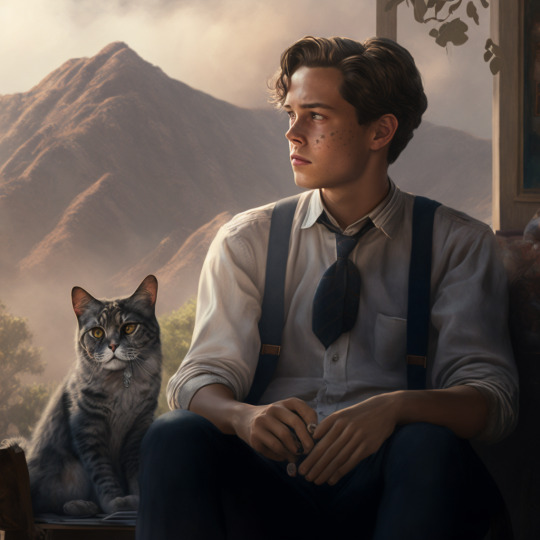
Conversations around Goncharov have continued, and I find myself wondering what it is about this moment in time and this type of activity that continues to capture so many people’s imagination and engagement?
Tumblr is a hub for public fandom culture and community in a way that the other social media platforms are not. It’s where you can find discourse and fanfiction/fanart for almost anything.
Still, this is a little different and on a much larger scale. At a time when people are looking for Twitter alternatives, with the stress and joy of holidays approaching, what is drawing so many people in?
We talked about this over Thanksgiving: the way Goncharov allowed people low-stakes permission to create, to play to their particular strengths, to connect with other people, to escape reality for a moment, to build a new community. We talked about the shortcomings and challenges we saw: power dynamics, issues of race, etc.
It’s an evolving experiment, and as such, it has been shaped by the many variables involved and course-corrected each time someone notices a gap or opportunity: What would a musical look like? What if some of the actors had gone on Sesame Street or the Muppet Show? What if Gonzo played Goncharov and Miss Piggy played Katya? What would the remake look like set in 1980s NYC? What recipes might be created for the Goncharov cookbook? (I remember how much fun we had making the Forking Good cookbook.) There really is no end to what people can come up with. I’m waiting to see if Goncharov gets a Tom Gauld comic or a mention on Saturday Night Live.
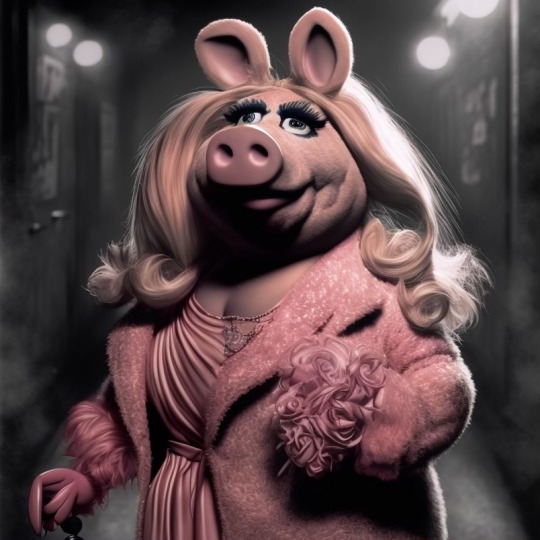
It seems relevant that role-playing games, both online and tabletop, have recently increased in popularity. Dungeons and Dragons was the cornerstone of Stranger Things, and 50,000 people attended Gen Con (tabletop game convention) in 2022. It’s not my world, although I’ve watched the joy my kids take in it. My energy goes into writing, but I can absolutely appreciate the fun of playing together.
As a writer, I walk around with worlds in my head, but I don’t get to share them until they get published. Something like Goncharov, which was not an intellectual property “owned” by anyone, gives people permission to imagine and play.
I think it speaks to a need we have an human beings to experience connection, joy, wonder, and hope. We've always had those needs. People have been gathering around fires or tables, telling stories, for thousands of years.
Today, the hearth may be a computer or a phone, but the desire is not that different. My November began with the publication of Mother Christmas, my graphic novel, the secret origin of the Santa Claus story which is rooted in the ancient Muses, whose gifts inspire humanity. One of the questions my story attempts to answer is: Where does inspiration come from?
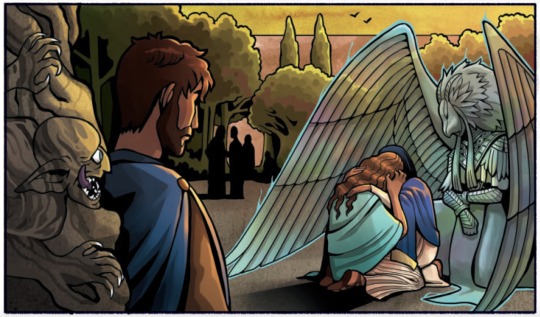
If we look at Goncharov we can see that inspiration comes from so many places. So much is possible when people given themselves permission to play, to shrug off the inner critics and outer trolls, and to imagine for a moment a different world that they have a part in creating. That is such a powerful and compelling idea.
Stories remind us that we are not alone, that we share struggles, and that we can overcome obstacles. There are so many challenges in the world right now.
Maybe Goncharov is a lens through which people are seeing themselves and each other, reminding us how much fun it is to make-believe and how powerful it can be to have a shared image of the world.
The first step in creation is imagining. Exercising that muscle, allowing ourselves to play and tell stories and make art is a worthwhile one, and I think it's one that we need to survive. The Goncharov phenomenon gives me hope, because if we can have this many people put their energy into creating a whole world around Goncharov, just imagine what else is possible?
#goncharov#goncharov 1973#goncharov fanart#goncharov cookbook#thanksgiving#mother christmas#ttrpg#dnd stuff#muppets#gonchposting#storytelling#ice pick joe#gonzoart#lynda carter#henry winkler#collaboration#unreality#practice#cats of goncharov#cole sprouse
50 notes
·
View notes
Text

22 Years Old
Trans Man
White
Bisexual & Demiromantic
Butch Bear Cub
Artist/Writer/Musician
New Orleans born & raised ⚜

DNI
Right-Wingers (obviously)
ZIONISTS (fuck off)
Pro-Shippers/Anti-Antis/etc.
Pedos, Zoophiles, etc.
TERFs/SWERFs/FARTs
Truscum/Transmedicalists/Gender Essentialists
AI Art Supporters
Scabs/Non-Union-Supporters
DSMP/MCYT fans, SWIFTIES, Hazbin Hotel/Helluva Boss/Vivziepop fans, and MHA/BNHA fans (ignore if we're mutuals)
Main Interests
Animation: Steven Universe, The Owl House, Adventure Time, My Little Pony: FiM, Gravity Falls, Rick and Morty, She Ra: PoP, The Moomins Series, FMA:B, Yuri!! On Ice, Bigtop Burger, Futurama, Disenchantment, Tangled Series, Nimona, Dungeon Meshi, Scott Pilgrim, Clone High, DCU, & more
Live Action: Doctor Who, Good Omens, What We Do in the Shadows (2014 & 2019), Star Trek: TOS, Star Wars (until TFA), House MD, Heartstopper, Bones, SOME Marvel films, and dozens of fantasy, sci-fi, and comedy movies
Music: Fall Out Boy, Paramore, Jack Stauber, My Chemical Romance, Janelle Monae, Bo Burnham, Halsey, Panic! at the Disco (pre DOAB lol), ABBA, Talking Heads, The Cure, Tears for Fears, System of a Down, David Bowie, Frank Ocean, Lil Nas X, & more
Video Games: Genshin Impact, Legend of Zelda Series, Animal Crossing Series, Undertale/Deltarune, Danganronpa Series, Infamous Series, & more
Online Creators: Markiplier, Dan & Phil, Rhett & Link, Jenna & Julien, Hank Green, The McElroys, Game Grumps, Brian Jordan Alvarez, Jerma985, Snapcube, Worthikids, & more
Sideblogs
Vent: @lifthisheadachehead
Art: @stevenartsblog
Aesthetic: @luminescentaesthetic
Witchcraft: @copperinsidesgold
Kin/Therian: @steven-kiin
Activism/Politics: @stevenftm
Kpop: @jisungbri
NSFT/18+: dm me!
Misc
My DMs are always open! I love making friends so feel free to chat with me any time! :3
Feel free to message me if anything I say or post comes across as unkind or offensive and I'd be happy to have a dialogue about the situation and try to make up for it 💗
My (18+) Rick Sanchez discord server is here
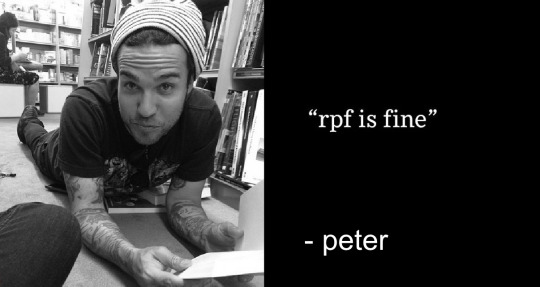

#this is still a work in progress but im lazyyyy#my post#personal#about#check this out too:#my art#my ocs#my face
19 notes
·
View notes
Text
CFP: AI and Fandom
Unfortunately, this special issue will not be moving forward. All submitted pieces are being considered for our general issue.
Due in part to well-publicised advancements in generative AI technologies such as GPT-4, there has been a recent explosion of interest in – and hype around – Artificial Intelligence (AI) technologies. Whether this hype cycle continues to grow or fades away, AI is anticipated to have significant repercussions for fandom (Lamerichs 2018), and is already inspiring polarised reactions. Fan artists have been candid about using creative AI tools like Midjourney and DALL-E to generate fan art, while fanfiction writers have been using ChatGPT to generate stories and share them online (there are 470 works citing the use of these tools on AO3 and 20 on FanFiction.net at the time of writing). It is likely the case that even greater numbers of fans are using such tools discreetly, to the consternation of those for whom this is a disruption of the norms and values of fan production and wider artistic creation (Cain 2023; shealwaysreads 2023). AI technology is being used to dub movies with matching visual mouth movements after filming has been completed (Contreras 2022), to analyse audience responses in real-time (Pringle 2017), to holographically revive deceased performers (Andrews 2022; Contreras 2023), to build chatbots where users can interact with a synthesised version of celebrities and fictional characters (Rosenberg 2023), to synthesise celebrities’ voices (Kang et al. 2022; Nyce 2023), and for translation services for transnational fandoms (Kim 2021).
Despite the multiple ways in which AI is being introduced for practical implementations, the term remains a contested one. Lindley et al (2020) consider “how AI simultaneously refers to the grand vision of creating a machine with human-level general intelligence as well as describing a range of real technologies which are in widespread use today” (2) and suggest that this so called ‘definitional dualism’ can obscure the ubiquity of current implementations while stoking concerns about far-future speculations based on media portrayals. AI is touted as being at least as world-changing as the mass adoption of the internet and, regardless of whether it proves to be such a paradigm shift, the strong emotions it generates make it a productive site of intervention into long-held debates about: relationships between technology and art, what it means to create, what it means to be human, and the legislative and ethical frameworks that seek to determine these relationships.
This special issue seeks to address the rapidly accelerating topic of Artificial Intelligence and machine learning (ML) systems (including, but not limited to Generative Adversarial Networks (GANs), Large Language Models (LLMs), Robotic Process Automation (RPA) and speech, image and audio recognition and generation), and their relationship to and implications for fans and fan studies. We are interested in how fans are using AI tools in novel ways as well as how fans feel about the use of these tools. From media production and marketing perspectives we are interested in how AI tools are being used to study fans, and to create new media artefacts that attract fan attention. The use of AI to generate transformative works challenges ideas around creativity, originality and authorship (Clarke 2022; Miller 2019; Ploin et al. 2022), debates that are prevalent in fan studies and beyond. AI-generated transformative works may present challenges to existing legal frameworks, such as copyright, as well as to ethical frameworks and fan gift economy norms. For example, OpenAI scraped large swathes of the internet to train its models – most likely including fan works (Leishman 2022). This is in addition to larger issues with AI, such as the potential discrimination and bias that can arise from the use of ‘normalised’ (exclusionary) training data (Noble 2018). We are also interested in fan engagement with fictional or speculative AI in literature, media and culture.
We welcome contributions from scholars who are familiar with AI technologies as well as from scholars who seek to understand its repercussions for fans, fan works, fan communities and fan studies. We anticipate submissions from those working in disparate disciplines as well as interdisciplinary research that operates across multiple fields.
The following are some suggested topics that submissions might consider:
The use of generative AI by fans to create new forms of transformative work (for example, replicating actors’ voices to ‘read’ podfic)
Fan responses to the development and use of AI including Large Language Models (LLMs) such as ChatGPT (for example, concerns that AO3 may be part of the data scraped for training models)
Explorations of copyright, ownership and authorship in the age of AI-generated material and transformative works
Studies that examine fandoms centring on speculative AI and androids, (e.g. Her, Isaac Asimov, WestWorld, Star Trek)
Methods for fan studies research that use AI and ML
The use of AI in audience research and content development by media producers and studios
Lessons that scholars of AI and its development can learn from fan studies and vice versa
Ethics of AI in a fan context, for example deepfakes and the spread of misinformation
Submission Guidelines
Transformative Works and Cultures (TWC, http://journal.transformativeworks.org/) is an international peer-reviewed online Gold Open Access publication of the nonprofit Organization for Transformative Works, copyrighted under a Creative Commons License. TWC aims to provide a publishing outlet that welcomes fan-related topics and promotes dialogue between academic and fan communities. TWC accommodates academic articles of varying scope as well as other forms, such as multimedia, that embrace the technical possibilities of the internet and test the limits of the genre of academic writing.
Submit final papers directly to Transformative Works and Cultures by January 1, 2024.
Articles: Peer review. Maximum 8,000 words.
Symposium: Editorial review. Maximum 4,000 words.
Please visit TWC's website (https://journal.transformativeworks.org/) for complete submission guidelines, or email the TWC Editor ([email protected]).
Contact—Contact guest editors Suzanne Black and Naomi Jacobs with any questions before or after the due date at [email protected].
Due date—Jan 1, 2024, for March 2025 publication.
Works Cited
Andrews, Phoenix CS. 2022. ‘“Are Di Would of Loved It”: Reanimating Princess Diana through Dolls and AI’. Celebrity Studies 13 (4): 573–94. https://doi.org/10.1080/19392397.2022.2135087.
Cain, Sian. 2023. ‘“This Song Sucks”: Nick Cave Responds to ChatGPT Song Written in Style of Nick Cave’. The Guardian, 17 January 2023, sec. Music. https://www.theguardian.com/music/2023/jan/17/this-song-sucks-nick-cave-responds-to-chatgpt-song-written-in-style-of-nick-cave.
Clarke, Laurie. 2022. ‘When AI Can Make Art – What Does It Mean for Creativity?’ The Observer, 12 November 2022, sec. Technology. https://www.theguardian.com/technology/2022/nov/12/when-ai-can-make-art-what-does-it-mean-for-creativity-dall-e-midjourney.
Contreras, Brian. 2022. ‘A.I. Is Here, and It’s Making Movies. Is Hollywood Ready?’ Los Angeles Times, 19 December 2022, sec. Company Town. https://www.latimes.com/entertainment-arts/business/story/2022-12-19/the-next-frontier-in-moviemaking-ai-edits.
———. 2023. ‘Is AI the Future of Hollywood? How the Hype Squares with Reality’. Los Angeles Times, 18 March 2023, sec. Company Town. https://www.latimes.com/entertainment-arts/business/story/2023-03-18/is-a-i-the-future-of-hollywood-hype-vs-reality-sxsw-tye-sheridan.
Kang, Eun Jeong, Haesoo Kim, Hyunwoo Kim, and Juho Kim. 2022. ‘When AI Meets the K-Pop Culture: A Case Study of Fans’ Perception of AI Private Call’. In . https://ai-cultures.github.io/papers/when_ai_meets_the_k_pop_cultur.pdf.
Kim, Judy Yae Young. 2021. ‘AI Translators and the International K-Pop Fandom on Twitter’. SLC Undergraduate Writing Contest 5. https://journals.lib.sfu.ca/index.php/slc-uwc/article/view/3823.
Lamerichs, Nicolle. 2018. ‘The next Wave in Participatory Culture: Mixing Human and Nonhuman Entities in Creative Practices and Fandom’. Transformative Works and Cultures 28. https://doi.org/10.3983/twc.2018.1501.
Leishman, Rachel. 2022. ‘Fanfiction Writers Scramble To Set Profiles to Private as Evidence Grows That AI Writing Is Using Their Stories’. The Mary Sue, 12 December 2022. https://www.themarysue.com/fanfiction-writers-scramble-to-set-profiles-to-private-as-evidence-grows-that-ai-writing-is-using-their-stories/.
Lindley, Joseph, Haider. Akmal, Franziska Pilling, and Paul Coulton. 2020. ‘Researching AI legibility through design’. In Proceedings of the 2020 CHI Conference on Human Factors in Computing Systems (pp. 1-13). https://doi.org/10.1145/3313831.3376792
Miller, Arthur I. 2019. The Artist in the Machine: The World of AI-Powered Creativity. Cambridge, Massachusetts: MIT Press.
Noble, Safiya Umoja. (2018) Algorithms of Oppression: How Search Engines Reinforce Racism. New York, USA: New York University Press.
Nyce, Caroline Mimbs. 2023. ‘The Real Taylor Swift Would Never’. The Atlantic, 31 March 2023. https://www.theatlantic.com/technology/archive/2023/03/ai-taylor-swift-fan-generated-deepfakes-misinformation/673596/.
Ploin, Anne, Rebecca Eynon, Isis Hjorth, and Michael Osborne. 2022. ‘AI and the Arts: How Machine Learning Is Changing Artistic Work’. Report from the Creative Algorithmic Intelligence Research Project. University of Oxford, UK: Oxford Internet Institute. https://www.oii.ox.ac.uk/news-events/reports/ai-the-arts/.
Pringle, Ramona. 2017. ‘Watching You, Watching It: Disney Turns to AI to Track Filmgoers’ True Feelings about Its Films’. CBC, 4 August 2017. https://www.cbc.ca/news/science/disney-ai-real-time-tracking-fvae-1.4233063.
Rosenberg, Allegra. 2023. ‘Custom AI Chatbots Are Quietly Becoming the next Big Thing in Fandom’. The Verge, 13 March 2023. https://www.theverge.com/23627402/character-ai-fandom-chat-bots-fanfiction-role-playing.
shealwaysreads. 2023. “Fascinating to see…” Tumblr, March 28, 2023, 11:53. https://www.tumblr.com/shealwaysreads/713032516941021184/fascinating-to-see-a-take-on-a-post-about-thehttps://www.tumblr.com/androidsfighting/713056705673592832?source=share
#cfp#twc#otw#fan studies#fandom#academia#academic journals#academic chatter#call for papers#call for submissions#ai#artifical intelligence#machine learning#LLMs#chatgpt#ai fanfic#ai fanart#ai ethics#data ethics
13 notes
·
View notes
Text
Submission Window: November 1, 2023 - December 31, 2023
Payment: 8¢ per word
Theme: Speculative flash fiction
Interstellar Flight Press seeks speculative flash fiction for 2024 publication in our online magazine and yearly anthology. We will publish one piece of flash fiction a month in 2024, celebrating micro and small fictions. Submissions will be read by our team of readers and final selections will be made by flash series editor, Annika Barranti Klein.
Guidelines:
Genres: as long as it’s speculative (even a little bit!), anything goes for genre. Please see below for specific content hard sells and loves.
Length: up to 1,250 words (no minimum)
Payment: 8¢ per word (minimum payment $25) within 30 days of publication. 1 print contributor’s copy of our yearly anthology.
Simultaneous subs? Yes! Please let us know right away if you need to withdraw a story by emailing [email protected].
Multiple subs? Yes! Up to three stories per person; please fill out a separate form for each story.
Response times: We aim to reply to submissions in 90 days. We will try to get first round answers (rejections or holds) out as quickly as possible.
Terms: Original stories, no reprints please. First English Rights with a 3-month exclusivity period. Inclusion in our annual print anthology.
Please do not send anything generated using the large language models commonly called AI; they are built on plagiarism and we won’t publish them. Tools like spellcheck are absolutely fine.
Accepted stories will be featured on our website and Patreon, where authors will be asked to complete a short Q&A interview for our patrons. All accepted stories will also be in our yearly anthology, along with the interview.
About the Flash Series Editor
Annika Barranti Klein’s flash fiction has been in Mermaids Monthly, The Future Fire, Milk Candy Review, HAD, Hallowzine, and Worlds of Possibility. Her longer fiction and poetry has been in Asimov’s, CRAFT, Fireside, Weird Horror, Fusion Fragment, Haven Spec, and Kaleidotrope. Her work has been nominated for the Pushcart, recommended in Quick Sips Reviews and on Tor.com, gone viral on Twitter (just one time!), and been a finalist in the Gotham Writers 2021 A Monster Comes contest and the Cast of Wonders 2023 flash fiction contest.
Annika writes nonfiction for Interstellar Flight Magazine and Book Riot, and has also been in Paste TV, The Toast, and more. She is a freelance editor and has worked with Interstellar Flight Press, Book Riot/My TBR, and private clients on projects ranging from novels to medical articles to listicles. Prior to getting into editing, she was a reader at a film company. She’s been a nanny, a caterer, sold advertising space in USA Today, and taught people how to knit.
Thanks to a convenient nick in the space-time continuum, she somehow also finds time to write novels and have a family — they are very understanding and can all make their own sandwiches (not the novels; they are total freeloaders).
Hard Sells:
Graphic violence, especially sexual violence, domestic violence, or suicide — please include content warnings at the top of your story.
Stream of consciousness
Super vague endings (I love ambiguity, but don’t want to be left wondering wtf I just read)
Racism, sexism, homo- and transphobia are unacceptable themes, but may be all right within the story (especially if those are your margins and you’re exploring your reality in fiction) — please include content warnings at the top of your story.
Clichés
Loves:
Beautiful, deliberate writing
Time loops
Fun use of form, including “found footage” stories
Friendship, feminism, found family
Endings that make me rethink the story and/or immediately read it again with new context
Tropes
Some flash fiction I love:
The Hulder’s Husband Says Don’t by Kate Lechler
Giants by Allison Mulder
Advanced Word Problems in Portal Math by Aimee Picchi
Space-Time by Stella Lei
Silver and Shadow, Spruce and Pine by Maria Haskins
You Called Me by Avra Margariti
A Case for De-Extinction at the End of the World by Lyndsie Manusos
Bone Deep by K.C. Mead-Brewer
From the Journal of Sawyer L. Gibbs, Hero, Aged 13 ½ by Premee Mohamed
Untitled [daycare worker at the end of the world] by bixbythemartian
Unknown Number by Blue Neustifter
SUBMIT A FLASH FICTION
Via: Interstellar Flight Magazine.
4 notes
·
View notes
Text
GREMLINS (1984) – Episode 250 – Decades Of Horror 1980s
“Ai-yah. You teach him to watch TV?” Do you mean there was a fourth rule? Join your faithful Grue Crew – Chad Hunt, Bill Mulligan, Crystal Cleveland, and Jeff Mohr, along with guest host Ralph Miller – as they take an effects-focused dive into Joe Dante’s Gremlins (1984).
Decades of Horror 1980s
Episode 250 – Gremlins (1984)
Join the Crew on the Gruesome Magazine YouTube channel!
Subscribe today! Click the alert to get notified of new content!
https://youtube.com/gruesomemagazine
Decades of Horror 1980s is partnering with the WICKED HORROR TV CHANNEL (https://wickedhorrortv.com/) which now includes video episodes of 1980s and is available on Roku, AppleTV, Amazon FireTV, AndroidTV, and its online website across all OTT platforms, as well as mobile, tablet, and desktop.
A young man inadvertently breaks three important rules concerning his new pet and unleashes a horde of malevolently mischievous monsters on a small town.
Director: Joe Dante
Writer: Chris Columbus
Produced by:
Michael Finnell (producer) (produced by)
Kathleen Kennedy (executive producer)
Frank Marshall (executive producer)
Steven Spielberg (executive producer)
Music by: Jerry Goldsmith
Cinematography by: John Hora (director of photography)
Editing by: Tina Hirsch
Casting By: Susan Arnold
Production Design by: James H. Spencer
Special Effects:
Chris Walas (creator: Gremlins)
Bob MacDonald Jr. (special effects foreman)
R.A. MacDonald (special effects supervisor) (as Bob MacDonald Sr.)
Selected Cast:
Hoyt Axton as Randall Peltzer
John Louie as Chinese Boy
Keye Luke as Grandfather
Don Steele as Rockin’ Ricky Rialto (voice)
Susan Burgess as Little Girl
Scott Brady as Sheriff Frank
Arnie Moore as Pete’s Father
Corey Feldman as Pete
Harry Carey Jr. as Mr. Anderson
Zach Galligan as Billy
Dick Miller as Mr. Futterman
Phoebe Cates as Kate
Polly Holliday as Mrs. Deagle
Belinda Balaski as Mrs. Harris
Edward Andrews as Mr. Corben
Judge Reinhold as Gerald Hopkins
Chuck Jones as Mr. Jones
Glynn Turman as Roy Hanson
Tracy Wells as Schoolchild
Jonathan Banks as Deputy Brent
Frank Welker as Stripe / Mogwai / Gremlins (voice)
Howie Mandel as Gizmo (voice)
Fred Newman as Mogwai / Gremlins (voice)
Mark Dodson as Mogwai / Gremlins (voice)
Michael Winslow as Mogwai / Gremlins (voice)
Peter Cullen as Mogwai / Gremlins (voice)
Bob Bergen as Mogwai / Gremlins (voice) (as Bob Berger)
Michael Sheehan as Mogwai / Gremlins (voice) (as Mike Sheehan)
Bob Holt as Mogwai / Gremlins (voice)
Richard Carlson as Dr. Research (archive footage) (uncredited)
Jerry Goldsmith as Man in Telephone Booth Glancing at Camera (uncredited)
William Schallert as Father Bartlett (uncredited)
Steven Spielberg as Man in Electric Wheelchair (uncredited)
Kenneth Tobey as Mobil Gas Station Attendant (uncredited)
Effects artist Ralph Miller joins the Grue-Crew to add his experience working on Gremlin’s creature crew, led by Chris Walas, the designer of Mogwai and the gremlins. Though the crew focuses on the film’s effects, they also delve into the cast, cameos, crew, and behind-the-scenes stories.
In July 2014, Doc Rotten and Thomas Mariani covered Gremlins before the Monster Movie Podcast became Decades of Horror 1980s. Check it what they had to say at this link:
Monster Movie Podcast Episode 68 – Gremlins 1984
As of 21 January 2024, Gremlins is available for streaming from many PPV sites and on physical media in 4K Ultra HD and Blu-ray formats.
Every two weeks, Gruesome Magazine’s Decades of Horror 1980s podcast will cover another horror film from the 1980s. The next episode’s film, chosen by Jeff, will be Slaughterhouse (1987). They may need a shower after this one.
Please let them know how they’re doing! They want to hear from you – the coolest, grooviest fans – so leave them a message or comment on the Gruesome Magazine Youtube channel, on the Gruesome Magazine website, or email the Decades of Horror 1980s podcast hosts at [email protected].
Check out this episode!
2 notes
·
View notes
Text
Quick Word on the Strike

Say it ain't so... A little over 15 years after the WGA strike of late 2007-early 2008, we have now entered *another* strike.
Whenever I'm not espousing animation opinions and hyperfixations on here, I'm actually writing stories and making comics.
It takes "writers" to tell the story, visually, among many other kinds of artists who get the short end of the stick in this capitalist hellscape. The strike is really exposing where people fall on this whole issue, and the utter indifference and even outright contempt some have towards the people that work their collective bums off to make your entertainment in the first place.
A lot of that is why I've really dialed back how I used to be online about animated features that I didn't think were up to my expectations. It's easy to rag on writers for... Well... Writing, that you don't think works. Most of the time, from my perspective and just simply listening to what filmmakers have to say, it's people making decisions that they think are the right ones at the right time, not knowing if they'll land some 1-2 years later. You certainly won't get that kind of honesty and perceived human mistakes with *AI*... I shudder at the current techbro circlejerking of this nonsense, and the consequences it could have on us artists, writers, and creatives... And we were already seeing some bleak stuff unfold in the industry pre and post-outbreak eras of COVID-19.
And especially in animation, too... What with mergers outright killing projects and whole studios (Disney shuttering Blue Sky in early 2021, and nearly killing NIMONA), favorites, and other completed things being thrown into a black hole - never to be seen again because they're now "tax write-offs". I don't care if that's how the business works, okay, it's inherently garbage that someone's hard work... Something someone worked years and years on... Can't be seen by the public because of green paper and abstract phony concepts. When a work of art is made, it's for the whole entire world, and that's all kinds of wrong to me. Warner Bros. Discovery CEO David Zaslav is essentially the poster-boy for this kind of thing, having done this to FINAL SPACE, a largely finished BATGIRL movie, and an entirely-completed SCOOB! prequel called HOLIDAY HAUNT. No work of media should have to be locked away in perpetuity, or in even some cases, erased from existence.
Which is why I also try to appreciate everything that actually *does* get out into the world, even if it's not to my liking. I notice some animation fans here and there vent their not-unfounded frustrations on things that aren't to blame. "Oh come on, and yet BIG MOUTH gets another season?" That's still a show that keeps people employed, and keeps roofs over their heads, food on their tables. Animators, writers, artists, etc. aren't living in posh mansions. They're always on the line...
(I realize BIG MOUTH is ending after its 8th season, but you get the idea, right?)
So... We shall see what this all means for live-action stuff going ahead, considering the big hit a lot of tentpole movies and TV shows took during the 2007-08 strike. The strike is often cited as the reason something like QUANTUM OF SOLACE underwhelmed, or why TRANSFORMERS: REVENGE OF THE FALLEN got such terrible reception in comparison to the first film (which got a more middling reception). As for animation writers, they already have it rough, so I can only imagine what kind of toll this will take on the crews and their projects going forward... But one thing's for certain, it's absurd that these conglomerate CEOs get richer and the writers have to strike in order to make things somewhat right. They deserve so much better. Don't give me that "it's how it goes" mumbojumbo, that's just an excuse to be okay with stuff that needs to be changed. Such indifference is the source of many other problems in this world...
Not to sound melodramatic, but human creativity is a beautiful thing to me... and often times, the business side of it gets too big for its britches and ruins what should be a universal thing, the universal language of telling stories. And that people have to turn that creativity and love of making art into something that merely keeps them alive. Barely, so... Yeah, it's all kinda messed up when you step back and look at it clearly for a second...
6 notes
·
View notes